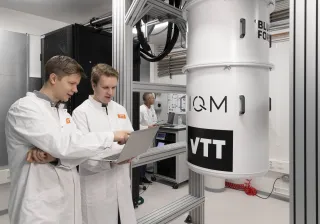The computing power of quantum technology can revolutionise our everyday lives, create a new branch of industry in Finland and provide solutions to the challenges facing humankind, such as climate change. We do not know exactly what the consequences of quantum computers will be, but it will be something gigantic. Special expertise is springing up fast in Finland at universities, VTT and companies – now is the time to invest in development and ensure that we are among the drivers of the quantum revolution.
I was a 7-year-old little boy when I bought my first pocket calculator with pocket money from my parents. The device was magical: it computed any calculation instantly.
At that time, in 1973, only 25 years had passed since the invention of the first transistor. Today, the same technology – transistors and microcircuits – enables not only calculators, but the ubiquitous presence of electronics and digitalisation. Our everyday tools, the laptop and the smartphone, contain billions of transistors. They allow us to connect with anyone on the other side of the globe, watch thousands of films on Netflix, or order a 3D printer from China to our door. The fast, cheap and high computing power enabled by transistors has permanently revolutionised our everyday lives.
The next fundamental revolution – quantum technology – is already on its way. The “transistors” of the quantum world are being developed right now: basic technology that makes quantum computing possible. While the transistors of current computers generate digital bits, ones or zeros, a quantum computer calculates in qubits, which can be in superposition, that is, a mix of one and zero at the same time. As a result, quantum computers will be capable of massive computing power: for example, last year, Google announced that its quantum computer had calculated in 200 seconds what would have taken the best supercomputer 10,000 years to do.
Quantum computers are already being developed – also in Finland
The first quantum computers are already in development around the world. For the time being, they are the size of a room, enormously expensive, operate unreliably, and cannot do anything very useful – just like the first computers back in their day.
It is still worth it trying to catch this gigantic fish. Technology giants like IBM, Microsoft and Google, as well as the Chinese state, are taking part in the development race with stakes in the tens of billions. Quantum computers are being built here in Finland as well. A start-up company called IQM is implementing research carried out by VTT and Aalto University, i.e. developing a quantum computer that would be useful outside research institutes, too. VTT has long-standing experience in the design and manufacture of, for example, superconducting circuits, low-noise amplifiers and photonics components. All of these technologies are needed to build quantum computers.
Quantum technology is still in its infancy, and that is why now is just the right time to invest in its development in Finland. If we move fast enough, Finland can grab a slice of the growth of quantum technology, and a whole new branch of industry can emerge here. Just like how investments in the development of computers back in the day gave rise to Finland’s first computer and PC, ESKO and MikroMikko, which generated electronics industry in Finland and eventually brought forth the successful growth story of Nokia. The result was prosperity and growth for the whole of Finland.
We at VTT want to serve as playmakers to ensure the benefits of quantum computers for society and businesses – and to create sustainable growth.
Solutions to the great challenges facing humankind from quantum technology?
But what would we do with the astoundingly powerful quantum computing? Quantum computing is not yet suitable for everything, but it is already known to be superior in some tasks when compared to today’s technology.
The most interesting thing is how quantum technology could serve as a tool for solving the gigantic challenges facing humankind. Quantum computers could, for example, accelerate the development of breakthrough drugs by modelling molecules, or help find efficient and inexpensive ways to bind large amounts of carbon dioxide from the atmosphere – thus combating climate change. They could be used to support the development of emission-free energy and sustainable material production. Perhaps this new kind of super-efficient computation could help solve humankind’s toughest equation: how to accommodate the rise in people’s standard of living and economic growth within the limits of the Earth’s carrying capacity.
However, the truth is that we do not yet know what quantum technology will be used for. The inventors of transistors could not have imagined our current everyday life with smartphones in the 1940s, either. What technology is used for depends on the choices of us humans.
I hope that if I have an unprecedentedly powerful quantum computer (perhaps called a quantum phone) in my pocket instead of a calculator or a telephone in the 2050s, it will offer me something more amazing than just entertainment and consumption – a genuinely sustainable everyday life.





